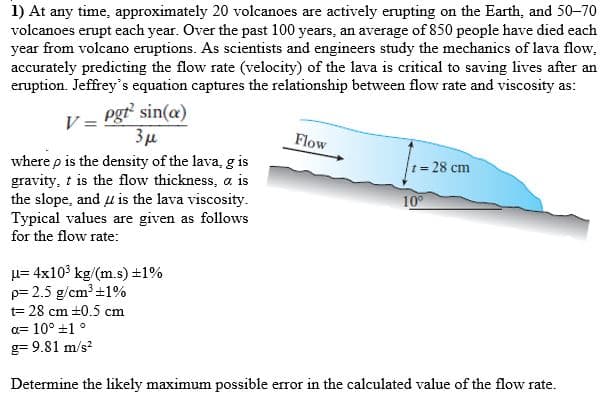At any time, approximately 20 volcanoes are actively erupting on the Earth, and 50–70 volcanoes erupt each year. Over the past 100 years, an average of 850 people have died each year from volcano eruptions. As scientists and engineers study the mechanics of lava flow, accurately predicting the flow rate (velocity) of the lava is critical to saving lives after an eruption. Jeffrey’s equation captures the relationship between flow rate and viscosity as: where ρ is the density of the lava, g is gravity, t is the flow thickness, α is the slope, and m is the lava viscosity. Typical values are given as follows for the flow rate: m= 4x103 kg/(m.s) ±1% ρ= 2.5 g/cm3 ±1% t= 28 cm ±0.5 cm α= 10° ±1 ° g= 9.81 m/s²
At any time, approximately 20 volcanoes are actively erupting on the Earth, and 50–70 volcanoes erupt each year. Over the past 100 years, an average of 850 people have died each year from volcano eruptions. As scientists and engineers study the mechanics of lava flow, accurately predicting the flow rate (velocity) of the lava is critical to saving lives after an eruption. Jeffrey’s equation captures the relationship between flow rate and viscosity as: where ρ is the density of the lava, g is gravity, t is the flow thickness, α is the slope, and m is the lava viscosity. Typical values are given as follows for the flow rate: m= 4x103 kg/(m.s) ±1% ρ= 2.5 g/cm3 ±1% t= 28 cm ±0.5 cm α= 10° ±1 ° g= 9.81 m/s²
Principles of Heat Transfer (Activate Learning with these NEW titles from Engineering!)
8th Edition
ISBN:9781305387102
Author:Kreith, Frank; Manglik, Raj M.
Publisher:Kreith, Frank; Manglik, Raj M.
Chapter5: Analysis Of Convection Heat Transfer
Section: Chapter Questions
Problem 5.13P: 5.13 The torque due to the frictional resistance of the oil film between a rotating shaft and its...
Related questions
Question
At any time, approximately 20 volcanoes are actively erupting on the Earth, and 50–70 volcanoes erupt each year. Over the past 100 years, an average of 850 people have died each year from volcano eruptions. As scientists and engineers study the
where ρ is the density of the lava, g is gravity, t is the flow thickness, α is the slope, and m is the lava viscosity. Typical values are given as follows for the flow rate:
m= 4x103 kg/(m.s) ±1%
ρ= 2.5 g/cm3 ±1%
t= 28 cm ±0.5 cm
α= 10° ±1 °
g= 9.81 m/s²

Transcribed Image Text:1) At any time, approximately 20 volcanoes are actively erupting on the Earth, and 50-70
volcanoes erupt each year. Over the past 100 years, an average of 850 people have died each
year from volcano eruptions. As scientists and engineers study the mechanics of lava flow,
accurately predicting the flow rate (velocity) of the lava is critical to saving lives after an
eruption. Jeffrey's equation captures the relationship between flow rate and viscosity as:
pgt sin(a)
3µ
where p is the density of the lava, g is
gravity, t is the flow thickness, a is
the slope, and u is the lava viscosity.
Typical values are given as follows
V =
Flow
t= 28 cm
10
for the flow rate:
µ= 4x10' kg/(m.s) ±1%
p= 2.5 g/cm +1%
t= 28 cm +0.5 cm
a= 10° +1 °
g= 9.81 m/s?
Determine the likely maximum possible error in the calculated value of the flow rate.
Expert Solution
This question has been solved!
Explore an expertly crafted, step-by-step solution for a thorough understanding of key concepts.
Step by step
Solved in 2 steps

Knowledge Booster
Learn more about
Need a deep-dive on the concept behind this application? Look no further. Learn more about this topic, mechanical-engineering and related others by exploring similar questions and additional content below.Recommended textbooks for you

Principles of Heat Transfer (Activate Learning wi…
Mechanical Engineering
ISBN:
9781305387102
Author:
Kreith, Frank; Manglik, Raj M.
Publisher:
Cengage Learning

Principles of Heat Transfer (Activate Learning wi…
Mechanical Engineering
ISBN:
9781305387102
Author:
Kreith, Frank; Manglik, Raj M.
Publisher:
Cengage Learning